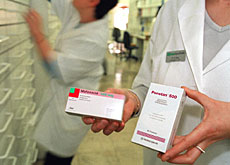Drug industry clamps down on bribery

A code of conduct designed to reduce corruption in the pharmaceutical industry has come into effect in Switzerland.
The voluntary code is intended to stop drug companies offering gifts or other incentives to doctors who prescribe their products.
Around 70 per cent of Swiss firms, including Novartis and Roche, have already adopted the guidelines.
“The purpose of the new code is to stop pharmaceutical companies from engaging in practices that result in conflicts of interest,” said Dieter Grauer of the Swiss Society of Chemical Industries, which devised the initiative.
The code – which came into effect on January 1 – also prohibits pharmaceutical firms from paying for holidays for doctors and their spouses. This is already illegal under Swiss law.
Grauer explained that the code was a means of encouraging the pharmaceutical industry to adhere to the law – and improve its image.
“It is true that on the one hand this code of conduct is an image enhancer; on the other hand it is a way of preventing misbehaviour,” he said.
“Pharmaceutical companies have an incentive to have a good public image and be free from attacks from the media.”
The industry has come under fire in recent years for a number of its drug promotion practices, including the sponsoring of doctors’ training courses, which the code also bans.
Higher standards
The Swiss Academy of Medical Sciences, which has been pushing for higher ethical standards, has welcomed the introduction of a code of conduct.
“We support the decision by the industry to introduce more transparency in an area which had become a little opaque,” said Werner Stauffacher, the organisation’s president.
However, Stauffacher insisted that the pharmaceutical industry was not the only guilty party.
“Doctors are perhaps even more at fault,” he said. “Some of them expect gifts from companies, not just drugs but also prosthetics and medical equipment.”
Ethical guidelines
In 2002 the Swiss Academy of Medical Sciences came out with its own ethical guidelines on how doctors should deal with the pharmaceutical industry.
Reto Steiner, a spokesman for the Swiss Medical Association, which represents the country’s doctors, said his organisation was also behind the initiative.
“Doctors should not be bought to promote medication,” Steiner told swissinfo.
But he added that close cooperation between doctors and pharmaceutical companies needed to continue in order to further medical advances.
“Medical research would not be possible in Switzerland without the financial support of pharmaceutical companies,” said Steiner.
Bribery
A Swiss law banning the practice of offering incentives to doctors to prescribe drugs came into effect in 2002.
Swissmedic, which is responsible for enforcing the law, has issued a number of warnings to companies that have broken the law.
The Swiss Society of Chemical Industries says it expects almost all of the country’s pharmaceutical firms to adopt the code of conduct in the coming weeks.
United States, German and French multinationals with offices in Switzerland have also signed up to the agreement.
swissinfo, Karin Kamp
A new code of conduct for the pharmaceutical industry came into effect on January 1, 2004.
The code offers guidelines on appropriate interactions between the pharmaceutical industry and doctors, as well as representatives from pharmacies.
It also includes guidelines on the sponsoring of clinical research.
A number of medical organisations as well as Swissmedic, the national medical watchdog, have welcomed the initiative.
There are 15,000 doctors in Switzerland.
The new code of conduct for the Swiss pharmaceutical industry came into effect on January 1.
A law covering medicinal products came into force on January 1, 2002.

In compliance with the JTI standards
More: SWI swissinfo.ch certified by the Journalism Trust Initiative











You can find an overview of ongoing debates with our journalists here . Please join us!
If you want to start a conversation about a topic raised in this article or want to report factual errors, email us at english@swissinfo.ch.